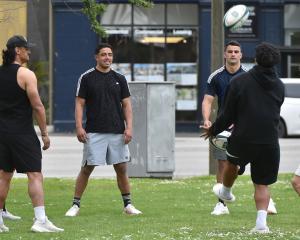All Blacks strength and conditioning coach Dr Nic Gill told an Otago Polytechnic physical conditioning symposium yesterday that this typified the attitude of the elite professional rugby players today.
"Our professional players have weekly programmes that involve a number of different sessions for different purposes," Gill (36), a graduate of the University of Otago School of Physical Education, said.
"Dan Carter fits into that but he's not the only one. All the senior pros are the same. They have developed habits and routines that work for them. We just have to fine tune the programmes if it is necessary."
Gill does not think the elite rugby players in New Zealand Super 15 teams train too hard.
"Most players in teams have balanced programmes," he said.
"When you are trying to perform each week over a number of months its not about training hard.
"I don't think any Super 15 team is guilty of that."
He did not think the number of injuries sustained in Super 15 rugby this year was caused by training too hard.
"Rugby is a collision sport and a lot of the injuries are no different than any other year," Gill said.
"There has not been any increase in injuries this year. Its just part of the landscape.
"Over the last few years injuries have been greater in number and intensity because the players are stronger and more physically prepared."
The All Blacks management team spent time in all the New Zealand franchises during the past six weeks and found they all run good programmes.
The All Blacks have had less injuries since Gill has been the strength and conditioning coach from 2008.
"We don't play week in and week out for a long period of time like they do in Super 15," he said.
"The bodies and the minds of the players and the staff have a chance to be refreshed.
"That shows how important and valuable some time out of rugby is to the body and the mind."
The All Blacks had two months leave after the World Cup and gradually worked back into a physical development programme as they returned to their franchises.
Gill also worked with New Zealand rowing from 2000 to 2008.
"The same principles apply across the board whether it is an individual or a team sport," Gill said.
"It is about making sure that the athletes programme involves performance and longevity."
Gill believes that the health of the population would be improved if physical education, and not just sports, was given a greater prominence in schools.
It was important to keep doing activities like running, jumping, hopping and squatting.
"The physical development of young kids is important for long-term physical health," he said.
"Everyone should be able to touch their toes."
He rates full squats as an important exercise to get a full range of motion through the hips and ankles.
"The lack of this ability is the cause of many long-term and chronic injuries like knee, ankle and back problems," he said.
"We have lost function through our hips and that leads to lumbar spine problems, lower back problems and an inability to move freely without pain.
"People in Asia have greater hip mobility and don't have the same number of lumbar spine or back injuries as Western society."












